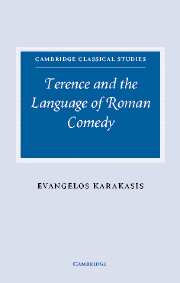Book contents
- Frontmatter
- Contents
- Acknowledgements
- Conspectus siglorum
- Introduction
- Part I Linguistic differentiation in Terence
- 1 Colloquialisms
- 2 Archaisms
- 3 Senilis μακρολογία and περισσολογία
- 4 Hellenisms
- 5 Features of elevated language
- 6 Idiolect
- 7 Plautus in Terence: the case of Eunuchus
- Part II Linguistic and stylistic unity in Roman comedy
- Bibliography
- Index locorum
- Index nominum et rerum
6 - Idiolect
Published online by Cambridge University Press: 22 September 2009
- Frontmatter
- Contents
- Acknowledgements
- Conspectus siglorum
- Introduction
- Part I Linguistic differentiation in Terence
- 1 Colloquialisms
- 2 Archaisms
- 3 Senilis μακρολογία and περισσολογία
- 4 Hellenisms
- 5 Features of elevated language
- 6 Idiolect
- 7 Plautus in Terence: the case of Eunuchus
- Part II Linguistic and stylistic unity in Roman comedy
- Bibliography
- Index locorum
- Index nominum et rerum
Summary
Introduction
Methodological framework
I have so far considered Terence's ability to differentiate the language of his characters by means of colloquial, archaic or elevated features and long-winded speech. There are, however, several other linguistic features which, without having any particular character – either colloquial, EL or elevated – are associated with the speech of specific characters or character types and are avoided by others. This is especially the case with overlapping linguistic options, both on a lexical and a syntactical level. In these cases it seems that specific characters or character types have a penchant for one of the overlapping lexical or syntactical equivalents. The rather vague term ‘penchant’ may be translated as either absolute use without exceptions or use in overwhelming majority – usually only one exception, often justified by the demands of the contextual setting.
By the term overlapping I understand synonymous or alternative words or expressions and constructions having the same syntactical function. Capitalising again on Maltby's methodology, my main linguistic tools for evaluating the equivalence or differentiation of lexical items and constructions have been:
for vocabulary: the OLD, the ThLL, McGlynn's Lexicon Terentianum, Maltby's seminal work;
for syntax: mainly the Latin grammars by Kühner and Stegmann and Leumann, Hofmann and Szantyr, Bennett's Syntax of Early Latin and Bléry's and Allardice's work on Terentian syntax.
In both fields, my personal detailed examination of the context of appearance has offered valuable insights.
- Type
- Chapter
- Information
- Terence and the Language of Roman Comedy , pp. 101 - 120Publisher: Cambridge University PressPrint publication year: 2005

